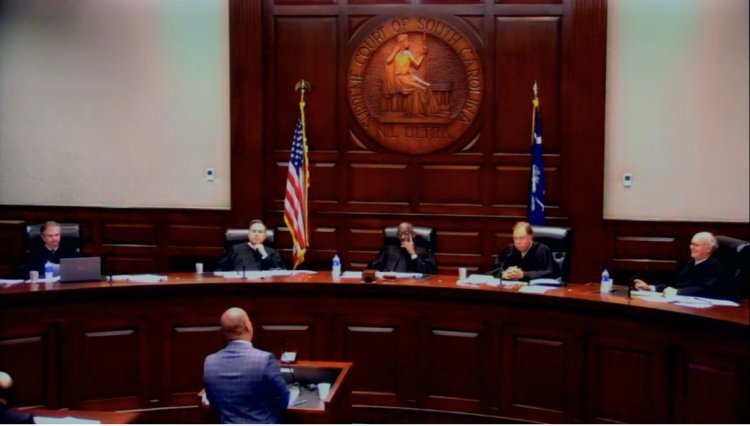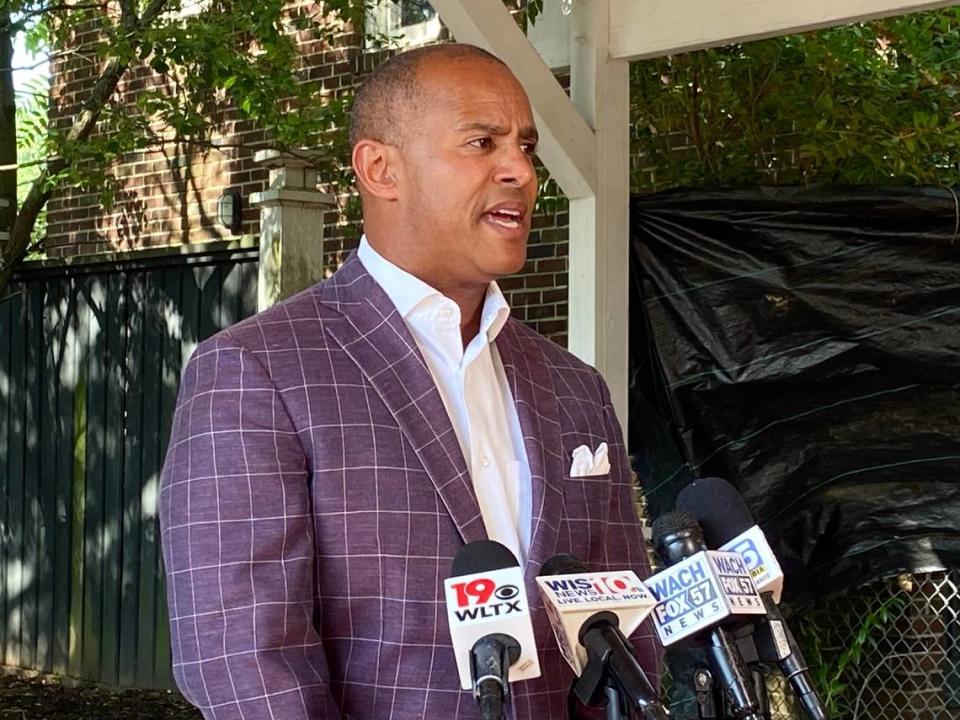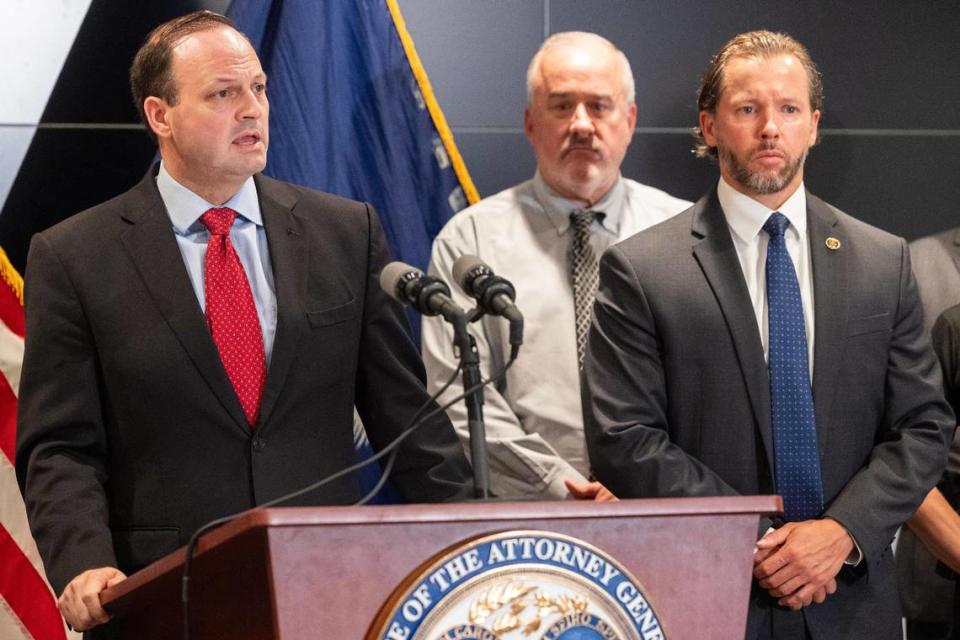Early release of SC man who terrorized family in 2006 home invasion shrouded in secrecy
Last year, a North Augusta man serving 40 years in prison for a violent home invasion received one of the largest criminal sentence reductions in recent South Carolina history.The reason Alberto Lopez was freed 14 years early isn’t clear from the public court record.The hearing that preceded his sentence reduction occurred out of public sight and all the principal documents in the case were sealed by a judge. The sparse supplemental order granting his reduction doesn’t explain why it was warranted or cite the legal mechanism used to carry it out.The State Media Co. has learned through a series of public records requests and interviews with officials involved in the case that Lopez was rewarded because he reported to police that a female corrections officer at McCormick Correctional Institution shared Jolly Ranchers, sunflower seeds and nude selfies with another inmate.ADVERTISEMENTAdvertisementLopez’s attorney Todd Rutherford, a powerful state lawmaker who sits on the commission that v

Last year, a North Augusta man serving 40 years in prison for a violent home invasion received one of the largest criminal sentence reductions in recent South Carolina history.
The reason Alberto Lopez was freed 14 years early isn’t clear from the public court record.
The hearing that preceded his sentence reduction occurred out of public sight and all the principal documents in the case were sealed by a judge. The sparse supplemental order granting his reduction doesn’t explain why it was warranted or cite the legal mechanism used to carry it out.
The State Media Co. has learned through a series of public records requests and interviews with officials involved in the case that Lopez was rewarded because he reported to police that a female corrections officer at McCormick Correctional Institution shared Jolly Ranchers, sunflower seeds and nude selfies with another inmate.
Lopez’s attorney Todd Rutherford, a powerful state lawmaker who sits on the commission that vets judicial candidates, had requested the proceedings be kept closed for Lopez’s safety, prosecutors said. The judge who granted the reduction order is a legislator’s daughter who has known Rutherford for decades and won a seat on the bench with his support.
Secrecy in criminal sentence reductions is not uncommon, The State’s review of three-plus years of S.C. Department of Corrections data found.
Nearly half of the “substantial assistance” reductions granted since 2021 were filed under seal, according to SCDC records. The reasons vary from wanting to conceal pending criminal investigations to protecting the safety of cooperating prisoners whose lives could be endangered if their assistance became known.
Prosecutors involved in the Lopez case said they thought nothing of maintaining his confidentiality at the time, but are being forced to reassess the decision in light of a recent state Supreme Court opinion that stressed the importance of open courts.
Writing last month in elaboration of their April decision to vacate the secret order that freed convicted murderer Jeroid Price — another Rutherford client — the state Supreme Court opined that a former Richland County judge had no authority to close the Price proceedings or seal the order that shaved 16 years off his sentence.


“Experience and logic insist that when a court considers reducing a sentence that has become the final judgment of the court, all aspects of the proceeding — from the solicitor’s motion required by the statute to the hearing and order — be open to the public,” Justice John Cannon Few wrote.
In their opinion, the high court identified five requirements that must be met to reduce an inmate’s sentence under the substantial assistance statute, which the Legislature passed in 2010 to incentivize prisoners to help law enforcement officials solve crimes and escape physical danger.
In the Price case, neither former Circuit Court Judge Casey Manning nor Fifth Circuit Solicitor Byron Gipson “made any effort to comply with even one of the requirements,” Few wrote, calling the facts of the case “unique and remarkably egregious.”
The governor’s office took action on the matter Thursday.
In what it said was an effort to restore the public’s confidence in the criminal justice system, Gov. Henry McMaster directed South Carolina solicitors to give the attorney general at least 10 days notice before filing any motion to reduce a criminal sentence and asked Attorney General Alan Wilson to review all early release motions to ensure they complied with the law.
“The State must do more to ensure that, if any inmates are to have their sentences reduced, only those who are legitimately worthy (and legally eligible) should receive this benefit — and only after following the statutorily prescribed process and complying with the Victims’ Rights Act,” McMaster wrote in a letter to the state’s solicitors.
Rutherford said he agreed that courts should be open, but argued that inmates who provide assistance are entitled to at least an initial closed hearing where a judge can weigh the potential risk of their identity being revealed.
“Secrecy is rooted in our criminal justice system, and there’s a reason for that,” he told The State. “Because a lot of people like Mr. Lopez, like Mr. Price put their lives on the line by helping out the state of South Carolina.”
Rutherford asserted the state Supreme Court decision had “weakened an institution,” and predicted that prisoners would cease cooperating with law enforcement officials if they had no ability to maintain their anonymity.
“You’re going to stop the flow of information,” he said. “You’re going to increase the harm to corrections officers and inmates, and decrease the safety of the institution.”
First Circuit Solicitor David Pascoe, who prosecutes cases in Orangeburg, Calhoun and Dorchester counties, acknowledged there are circumstances that warrant closing hearings or sealing portions of the court record, but said such decisions must be made on a case-by-case basis. Secrecy, he said, can’t be the default.
“If you allow that to happen,” Pascoe said. “That’s when you can run into corruption and abuse. As our courts have said, public access to criminal proceedings operates as a curb on prosecutorial and judicial misconduct.”


A sealed sentence reduction in Aiken County
Deputy Solicitor David Miller, a self-described point man on “weird stuff” for the Second Circuit solicitor’s office, spearheaded the office’s handling of Lopez’s substantial assistance case.
“It’s not something that happens every day or even every month,” he said of substantial assistance claims, “but it just so happened that I had done this before. I knew the process.”
Miller said Rutherford contacted him in 2020 and told him he had an Aiken County client in the Department of Corrections who was entitled to a sentence reduction under the substantial assistance statute.
Lopez, an undocumented Mexican immigrant, had provided “meaningful information” that led to the arrest of a 23-year-old corrections officer at the McCormick Correctional Institution, according to SCDC.
Breanna Alexandria Rouse had been employed by SCDC less than four months when she was arrested for allegedly providing an inmate snacks and explicit photographs, according to an arrest warrant. Lopez apparently alerted police to Rouse’s alleged misconduct, but was not the inmate who received the contraband directly, an SCDC spokeswoman said.
At the time, he had been locked up for 14 years stemming from a 2006 incident in which he burst into the home of a North Augusta family, demanded to see people who did not live there and threatened to kill them. After forcing the family to plead for their lives, Lopez took the father outside and shot him eight times, according to news reports.
When police arrived, Lopez attacked the officers who attempted to arrest him, punching them in the face, upper body and stomach before eventually being subdued, a police report said.
Prosecutors theorized Lopez had been attempting to carry out a “hit job,” but entered the wrong house by mistake. He pled guilty in 2009 to two counts of kidnapping, assault and battery with intent to kill, possession of a firearm during the commission of a violent crime and resisting arrest.
The Second Circuit solicitor’s office took no position on relief for Lopez because it wasn’t familiar with the substance of his assistance, Miller said. Other than filing a motion in August 2020 to get the process rolling and notifying the circuit’s chief judge, as the statute requires, the solicitor’s office took a mostly hands-off approach to the case, he said.
When Rutherford called Miller shortly after filing and told him he needed the motion to be sealed, the deputy solicitor said the request made perfect sense to him. Lopez was an informant whose safety could be jeopardized if his cooperation was revealed.
So he went to Judge Courtney Clyburn Pope, a Second Circuit jurist who happened to be with him at the Aiken County courthouse at the time, and asked her to seal the motion. Clyburn Pope, the daughter of longtime state Rep. Bill Clyburn, D-Aiken, signed an order placing the motion and any resulting orders under seal, Miller said.
“I don’t think anybody thought twice about the fact that this should be done to protect Lopez,” he said.
According to Miller, that’s more or less where his direct involvement in the case ended.
He said he participated in early discussions with Rutherford and Clyburn Pope where a public hearing was ruled out — again, at Rutherford’s request — but wasn’t present for whatever private meeting was ultimately held to hash out the details of Lopez’s sentence reduction.
When Miller raised the issue of victim notification in an email thread with Rutherford and Clyburn Pope shortly before the judge signed the reduction order, he said he got no response.
“Frankly,” Miller said, “I assumed it had been done.”
Rutherford remembered the exchange differently. He said he recalled the judge asking if victims had been notified and Miller responding that he’d tried unsuccessfully to reach them.
Clyburn Pope, whose judicial appointment Rutherford supported three years earlier in a race that, coincidentally, pitted her against Miller and the Aiken County master-in-equity, did not respond to a request for comment.
The order she signed granting Lopez’s reduction was filed under seal in early 2022, leaving no public trace that his sentence had been reduced.
It almost certainly would have stayed that way, Miller said, had it not been for a conscientious Aiken County clerk of court who demanded that a supplemental order be filed to ensure that some public record of the reduction existed.
“The basic order was done completely at the insistence of the clerk of court,” he said. “It wouldn’t have gotten done otherwise.”
The supplemental order, which Miller described as “very, very bare bones,” directed Lopez’s sentences to be served concurrently, gave him credit for time served on his resisting arrest conviction and reduced his sentence on the kidnapping and assault charges from 30 to 18 years.
It didn’t explain why his sentence was reduced or cite the statute used to reduce it.
The modifications to Lopez’s sentence resulted in his immediate release from prison on March 17, 2022, about 14 years early, according to an SCDC spokeswoman. Since he was in the country illegally and had been under a detainer from U.S. Immigration and Customs Enforcement, Lopez was deported upon his release, a spokeswoman with the S.C. Department of Probation, Parole and Pardon Services confirmed.
Of the 16 inmates whose sentences have been reduced since 2020 under the substantial assistance statute, only Price received a larger reduction than Lopez, SCDC records show.
Rutherford defended the length of Lopez’s reduction and said it wasn’t extraordinary given the nature of his assistance, his immigration status and the solicitor’s indifference to the case.
“The Department of Corrections has a serious problem with contraband,” he said. “They’re trying to stem that tide, so when somebody gives information they need credit for that.”
The fact that the contraband in this case was snacks and nude photos doesn’t matter, Rutherford said, because the officer was compromised and subject to continued blackmail.
He also dismissed the notion that his success winning favorable outcomes for clients had any connection to his role on the state’s Judicial Merit Selection Commission and said any suggestion his past support for Clyburn Pope had influenced her decision in the Lopez case was “beyond absurd.”
“There are a number of people who cannot accept the fact that I am a Black man who can simply go into court and do a good job, that it must be because of something else,” he said. “There is nothing untoward about what I’ve done.”
SC solicitors reconsider sealing cases
Three other substantial assistance cases, all from 2021, were also filed under seal, SCDC records show.
In each case, prosecutors justified the measure on the grounds that inmates were assisting law enforcement in active investigations that could be threatened if their cooperation became public.
Unlike Lopez’s case, which rested on assurances from the Department of Corrections, all three 2021 cases were championed by local solicitor’s offices.
Eighth Circuit Solicitor David Stumbo, whose office advocated for reducing the sentence of a 56-year-old Newberry man who helped investigators with a multi-defendant murder case, said in a statement that his office stood by its decision, but declined further comment citing the pending murder case.
Once that case wraps up, Stumbo said, he’ll consider moving to unseal the reduction order in light of the South Carolina Supreme Court’s stated aversion to secrecy in such cases. A Stumbo spokesman said the solicitor’s office would no longer seek to seal substantial assistance cases.
Thirteenth Circuit Solicitor Walt Wilkins said he’s also open to re-evaluating the sealing of two substantial assistance cases in his jurisdiction.
Records related to the 2021 sentence reductions of two convicted drug traffickers were sealed after they cooperated with a Greenville County drug task force on separate significant operations, Wilkins said.
“In narcotics investigations, specifically where there is an ongoing investigation, we typically all agree that it needs to be sealed,” he said. “It was common policy that ongoing criminal investigations in narcotics are not made public.”
Wilkins said his office is re-examining its policy in light of the recent state Supreme Court opinion and hadn’t yet decided the proper balance between the need to protect covert drug investigations and the public’s right to know when and why some criminal sentences are reduced.
“It’s a brand new case and we’re still evaluating it, but it certainly has raised the issue and we certainly don’t want to do anything against current law,” he said.
Second Circuit Solicitor Bill Weeks, whose office facilitated Lopez’s sentence reduction, said going forward he would make every effort to hold substantial assistance hearings in open court and notify victims when an offender’s sentence is being reconsidered.
He acknowledged that his office probably should have insisted on a more transparent process in the Lopez case, but said he does not plan to revisit that case or seek to unseal it.
“At the time, the Supreme Court opinion wasn’t issued,” Weeks said. “I agree with their opinion now, but that wasn’t a mandate when this was done one-and-a-half years ago.”
The attorney general’s office, which successfully challenged Price’s reduction and release, is currently reviewing past sentence reductions to ensure all legal processes were followed.


Starting Thursday, it will also review all future sentence reduction requests, per the governor’s order.
Claire Brady, a spokeswoman for the attorney general, said earlier this week that the office was still formulating its position on some of the more ambiguous aspects of the substantial assistance statute in light of the high court’s opinion.
It’s possible the attorney general’s office proposes changes or clarifications to the substantial assistance statute as part of its 2024 legislative agenda, she said.
What's Your Reaction?

















